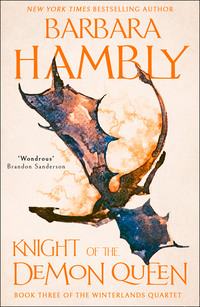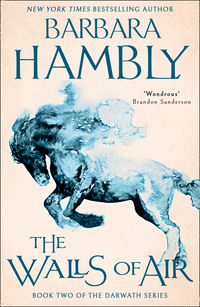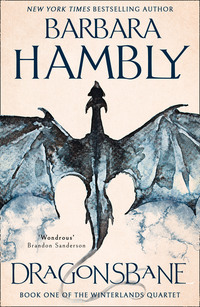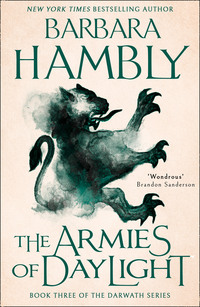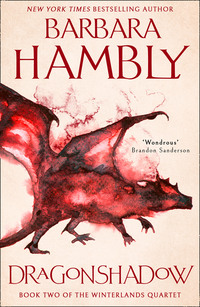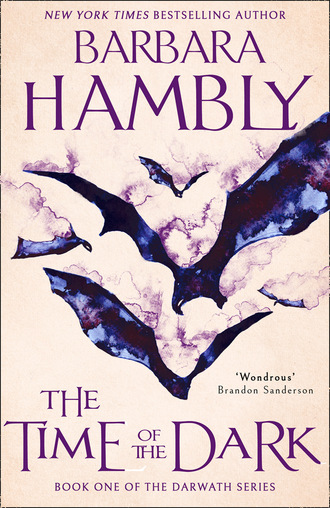
Полная версия
“I am virtually certain that some kind of tradition existed then regarding the Dark Ones, simply because the word for them was in the language. Sueg – dark – isueg – an archaic, personalized form of the same word. But they were only a vague rumor of shadow on the edges of the oldest legends – the misty memory of hidden fear. And if there was such a tradition, it did not connect them with the stairways themselves. So they remained, rooted in the abysses of time, an ancient mystery buried in the heart of civilization.
“Of the destruction of the ancient world we have no coherent account. We know that it happened within a matter of weeks. That what struck, struck worldwide, we also know – a simultaneous siege of horror. But the horror and the confusion were so overwhelming that virtually no record was preserved; and since defense against the Dark generally entailed uncontrolled use of fire as a weapon, we lost what little information we might have had about their coming. We know that they came – but we do not know why.
“Unable to fight, humankind fled and retreated to fortified Keeps, behind whose massive walls they led a windowless existence, creeping forth by day to till their fields and hiding when the sun went down. For three hundred years, absolute chaos and terror held sway on the earth, because there was no knowing where or when the Dark would come. Civilization crumbled, fading to a few glowing embers of the great beacon light that it had once been.
“And then—” Ingold spread his hands, showing them empty, like a sideshow magician. “The Dark no longer came. Whether the cessation was sudden or gradual, we cannot be sure, for by that time few people were literate enough to be keeping accurate records. Little villages had grown up outside the Keeps; in time, new little villages appeared on the crumbling ruins of the ancient cities whose very names had been forgotten through the intervening years. There were wars and change and long spaces of time. Old traditions faded; the very language changed. Old songs and stories were forgotten.
“Three thousand years is a long time, Gil. You’re an historian – can you tell me, with any accuracy, what happened three thousand years ago?”
“Uh—” Gil cast a hasty scan over her memories of Ancient Civilizations 1A. Marathon? Stonehenge? Hyksos’ invasions of Egypt? As a medievalist, she had only the foggiest impressions of anything prior to Constantine. What must it be like, she wondered, for the average Joe Doakes who hadn’t been to college and didn’t like history much anyway? Even something as hideous as the Black Death, an event which had grossly and permanently impacted western civilization, was only a name to eighty percent of the population – and that was only six hundred years ago.
Ingold nodded, his point made. It occurred to Gil to wonder how he had known that her subject was history, but he went on, as she was beginning to find was his habit, without explaining. “For many years I was the only one who knew anything about even the old tales of the Dark. I knew – I learned – that the Dark Ones were not utterly gone. Eventually I learned that they were not even much diminished in numbers. And I heard things that made me believe that they would return. Eldor’s father had me banished for speaking of it, which I thought small-minded of him, since sending me away could not reduce the danger – but perhaps he thought that I was lying. Eldor believed me. Without his preparations, I think we would all have perished the first night of their rising.”
“And now?” Gil asked softly.
“Now?” The night was far spent; the lines of weariness etched into his scarred face seemed to settle a little deeper. “We are holding out in the Palace at Gae. The main body of the Army under the command of the Chancellor of the Realm, Alwir, the Queen’s brother, has been in Penambra, where the raids were the worst. They should return to the city within days; but without a miracle they will be too late to prevent catastrophe. I have tried vainly to get in touch with the Council of Wizards in the Hidden City of Quo, but I fear they, too, may be besieged. They have retreated behind their defenses of power and illusion. Though I still have hopes that we can hold out long enough for Lohiro to send us aid of some kind, I would not want to wager the lives of my friends on that hope. The defenders at the Palace need me, Gil. Though I cannot do much, I will not leave them until it is beyond doubt that no effort of mine can save them.
“And that,” he said, “is where I need your help.”
She only looked at him, uncomprehending.
“You understand,” Ingold went on in that same quiet tone, “that by leaving it that late, I shall be cutting my escape very fine. In the last extremity, my only course will be to flee across the Void into some other world – this world. I can cross back and forth at will with relative impunity. Normally such a crossing is a shocking enough physical trauma for an adult. For an infant of six months, even under my protection, it can be injurious, and two such crossings in a short span of time could do the child real harm. I will therefore have to remain a day in this world, with the child, before I can return to some safer spot in my own.”
The light dawned. Gil smiled. “You need a place to hole up.”
“As you say. I need an isolated spot and a few creature comforts – a place to pass that time in obscurity. Do you know of such a place?”
“You could come here,” Gil offered.
Ingold shook his head. “No,” he said decidedly.
“Why not?”
The wizard hesitated before answering. “It’s too dangerous,” he said at last. He rose from his chair, moved restlessly to the flat rectangle of the window, and pushed the curtain aside, looking out, down into the apartment courtyard below. The greenish reflections of the courtyard lights in the waters of the swimming pool rippled over the old marks of alien battles on his face. “Too many things could happen. I have a great mistrust of fate, Gil. My powers are severely limited in your world. If something were to go wrong, I have no desire to try to explain my presence or that of the child to the local authorities.”
Gil had a brief, disturbing picture of Ingold, like some bearded refugee from the Society for the Preservation of Dungeons and Dragons in his shabby robes and killing sword, having a close encounter with the local police or the Highway Patrol. Despite her impression that the Highway Patrol would come off second best, she realized such a confrontation could not be risked. Not with so much at stake.
“There’s a place we used to go past on trail rides,” she said, after a moment’s thought.
“Yes?” He turned back from the window, letting the curtain swish shut.
“A girl I used to go to school with lives out near Barstow – it’s in the desert, way the hell east of here. I spent a couple weeks out there two summers ago. She had horses, and we used to ride all over the back-hills country. I remember there was a cabin, kind of a little house, out in the middle of some abandoned orange groves in the hills. We holed up there one afternoon during a thunderstorm. It isn’t much, but there’s running water and a kerosene stove, and it’s as isolated as you could want.”
Ingold nodded. “Yes,” he murmured, half to himself. “Yes, it should do.”
“I can bring you food and blankets,” she went on. “Just tell me when you’ll be there.”
“I don’t know that yet,” the wizard said quietly. “But you’ll know, at the time.”
“All right.” Though Gil was normally a suspicious person, it never occurred to her to question him, and this did not even surprise her about herself. She trusted him, she found, as if she had known him for years.
Ingold reached across the table and took her hand. “Thank you,” he said. “You are a stranger to our world and you owe us nothing – it is good of you to help.”
“Hey,” Gil protested softly. “I’m not a stranger. I’ve been in your world, and I’ve seen the Dark. I just about met King Eldor, as a matter of fact.” Then she paused, confused at her blunder, for she remembered that the King and the wizard were friends, and that Eldor was almost certainly going to die before the week was out.
But Ingold passed over her error like the gentleman he was. “I know Eldor would have been pleased to make your acquaintance,” he said. “And you shall always have his gratitude, and mine, for …”
Some sound in the night made him suddenly alert, and he broke off, raising his head to listen.
“What is it?” Gil whispered.
Ingold turned back to her. “I’m afraid I must go,” he said politely. His voice seldom betrayed worry or fear – he might have been making his excuses because of a prior engagement for tea with the Queen of Numenor. But Gil knew that something was happening, across the Void, in the embattled Palace at Gae.
He rose to go, the straight dark line of his mantle breaking over the sword at his hip. Gil thought of the danger and of the Dark waiting on the other side of the Void. She caught at his sleeve. In a voice smaller than she meant, she said, “Hey, take care.”
His smile was like the coming of the sun. “Thank you, my dear. I always do.” Then he walked a few paces to the center of the kitchen and put out his hand to push the fabric of the universe aside like a curtain. As he did so, he drew his sword, and Gil could see the cold light that burned up off the blade as he stepped into the mist and fire beyond.
TWO
_____________________
IT WAS THE GODDAM motherless fuel pump!
Rudy Solis identified immediately the gasp and drag of the old Chevy’s engine, automatically checked his rear-vision mirror, and scanned the dark, straight, two-lane highway ahead, though he knew there was nothing resembling a light in fifty miles. With all of Southern California to choose from, naturally the thing would decide to give up the ghost in the dead, endless stretch of desert and hill country that lay between Barstow and San Bernardino, miles from anywhere in the middle of Sunday night.
Rudy wondered if he could make it back to the party.
Be a lot of sorrow and tears if I can’t, he thought to himself, glancing over his shoulder at the ten cases of beer stacked amid the shredded foam, old newspapers, and greasy articles of unidentifiable clothing heaped in the sagging back seat. The engine faltered, coughed apologetically, and chugged on. Rudy cursed the owner of the car, the seventh magnitude rock-and-roll star at whose party he’d been drinking and sunburning himself into a stupor all weekend, and the buddies who’d volunteered him to make the beer run, thirty miles down the hills to Barstow; cursed them impersonally, and threw in a few curses at himself as well for being euchred into going.
Well, serves ’em right. Next time they want somebody to buy their beer for ’em, they can damn well lend me a decent car.
But the fact was that most people had arrived at Tarot’s party on motorcycles, as Rudy himself had. And Tarot – who had started out life as James Carrow and was still known as Jim when not wearing his flameout stage makeup – wasn’t about to lend his custom Eldorado to anybody, no matter how few cases of beer were left.
Well, what the hell. Rudy shook back the long hair from his eyes and risked another glance at the unrelieved blackness of empty desert reflected in his rear-view mirror. Everybody up at that hundred-thousand-dollar hideaway in the canyons was so drunk by this time that it was impossible to see what difference ten more cases of beer could make. If worst came to worst – which it looked like it was going to, from the sound of that engine – he could always find someplace in the hills to hole up in until morning and try to hitch a ride to the nearest phone then. There was a service road about ten miles farther on that he knew of, which would take him to a dilapidated shack in what remained of an old orange grove. Half-plastered as he was, he didn’t relish the idea of trying to do anything about the engine tonight, nor was the thought of sleeping by the road real appealing. Rudy took a drink from the half-empty bottle of wine propped on the seat beside him and drove on.
Rudy had been driving and dealing with cars and motorcycles half his life – not always with legal sanctions – but it took all his expertise to nurse the failing Chevy the mile or two from the last lighted billboard to the rutted track of the service road. The lag and jerk of the big V-8 engine as he maneuvered through potholes, gravel slides, and the ruinous washes of old stream beds made him wonder if the problem wasn’t simply a blocked line. He itched to climb out, raise the hood, and check – except that he had nothing resembling a light with him, and the odds were that, once stopped, nothing short of total rebuilding would get the stupid car started again. The feeble glare of the headlights picked out landmarks he knew from his motorcycle trips back this way: an oak tree twisted into the shape of a disapproving monk, gloomily damning the couples who came out here to park; a rock like a sleeping buffalo, silhouetted against the star-luminous sky. Rudy’s hobby of hunting with bow and arrow had given him a familiarity with half the wild country left in Southern California, a knowledge of these silent desert hills as casual as his knowledge of the inner workings of a V-8 engine or of the floor plan of his own sparsely furnished apartment. He was as much at home here as he was anywhere else.
Sometimes more so. Maybe the hunting was the reason, or maybe only the excuse. There were times when he simply took pleasure in being alone, a different pleasure from what was to be had from partying and raising hell, from horsing around with the guys at the body shop, from ratpack weekends in the desert. Never self-analytical, Rudy only understood that he needed the solitude, needed the touch of the empty land and the demand for slow skill and perfect accuracy. Perhaps it was this that had kept him on the edge of the biker crowd; he’d become acquainted with them at the body shop but never of them. Or perhaps it was simple cowardice.
Whatever his reasons, he was accepted for what he was; and though not part of any motorcycle gang, as an airbrush painter and pinstriper at Wild David’s body shop in Fontana, he was part of that world. Hence, he understood his inclusion in Tarot’s party – not that anybody in Southern California was excluded from Tarot’s party. Tarot’s local reputation included an apocryphal story about being a former member of the Hell’s Angels. But, thinking the matter over as he guided the thrombotic car deeper and deeper into the blackness of the hills, Rudy couldn’t imagine any gang admitting a member as essentially chickenhearted as Jim Carrow.
The car’s front wheels dropped suddenly into a twelve inch water-cut in the road with a heart-rending scrape of oil pan against rock. Rudy tried the engine twice and got only a tired whirring in response. He opened the door and climbed cautiously out, boots slipping on the round stones of the dry stream bed. Two days of continuous partying didn’t help his footing much. He ascertained at once that pushing wouldn’t help matters, for the car was nose-down with its front bumper inches from the far bank of the gully. It might, he decided, kneeling in the soft sand, be possible to back out if the engine could be started, but it wasn’t something he’d want to try at one-thirty in the morning.
Disgusted, he straightened up.
Starlight showed him the shape and roll of the hills, the shallow valley opening out to his right, with a dark clustering of dry, black-leaved citrus trees. The shack – a cabin, really – would be over there in the dense shadow of the hill, a hundred yards farther on.
Made it, he thought. Thank God for small favors.
It was surprising how silent the night was. There was little silence in the world; even away from people, there was usually street noise, airplanes, air conditioning. The cooling metal of the car’s engine ticked softly in the darkness; now and then, dried grass sighed at the memory of wind. Rudy’s eyes, adjusting to the wan glow of the Milky Way, slowly made out the edges of the cabin’s roof line, the shapes of long grass and twisted trees. His footfalls seemed very loud in that world of darkness.
Walking carefully, if not precisely staggering, he collected two six-packs of beer from the back seat and the remainder of his bottle of muscatel from the front. His head was beginning to ache. Just what I need. A busted fuel pump and a hangover to fix it with. They’ll probably figure I took the beer money and headed for Mexico.
He made his way up to the shack.
It stood solitary against the dark of the hills, the long grass around its peeling walls concealing the fossilized remains of dead farm equipment and broken bottles, the shabby asphalt tile of the roof sagging under the weight of accumulated leaves. He mounted the crazy front steps and set down his burdens on the narrow front porch, the mild chill of the sweet-scented night making him shiver as he stripped off his greasy denim jacket, wrapped it around his hand, and punched out a pane of the window beside the door to let himself in.
The lights worked, surprisingly. Hookup to the power lines in the grove, he decided, taking a quick look around the dingy kitchen. So did the sink, giving cold water but not hot. Well, you can’t have everything. In the cupboard under the sink he found three cans of pork and beans with prices stamped on them that were at least four years old, and a kerosene stove with half a can of kerosene.
Not bad, he reflected, if I had anything to cook. Further exploration revealed a minuscule bathroom and a cell like bedroom at the end of a narrow hall, with a sagging cot whose threadbare mattress would have been thrown out of any jail in the state as cruel and unusual.
Nothing to write home about, he thought, returning to the kitchen and thence to the star-limned silence of the front porch. He donned his jacket, on which the faded blue denim was rather gaudily illuminated with a flaming skull with roses in its eyes, and settled back against the door-jamb to polish off the muscatel and watch the night in peace. As the dark quiet of the hills soaked into his soul, he decided that there was, after all, something to be said for the place, a perfection of solitude in many ways superior to all the beer busts thrown by all the rock stars of California.
After a long time of silence he returned inside to sleep.
He woke up wondering what he’d done to annoy the little man with the sledgehammer who lived inside his head. He rolled over, to his instant regret, and wondered if he was going to die.
The room was barely light. He lay for a time staring at the shadows of the dry, cobwebby rafters, memories of yesterday and last night leaking back to his protesting consciousness: Tarot’s party; the fact that it was Monday and he was supposed to be back at work at the body shop, painting flaming sunsets on custom vans; last night’s beer run to Barstow; and that pig of a Chevy. It might be just the fuel lines, he told himself, his mind backtracking creakily through the obstacle course of a splitting headache and assorted other symptoms of the immoderate consumption of muscatel. If that was the case, he could be under way in a few hours. If it was the pump, he was in for a long walk.
Rudy made his way out of the house and down the steps, blinking in the pallid light of dawn. He was soon cursing the owner of the car. There wasn’t anything resembling a tool in all the bushels of trash in the trunk or on the back seat.
There was a shed half-buried in the weeds farther back in the groves behind the cottage, and he spent ten grimy minutes picking through spider-infested debris there in search of tools. The result was hardly satisfactory: a rusted Phillips screwdriver with a dog-chewed handle; a couple of blades with the business ends twisted; and an adjustable end wrench so corroded that he doubted it could be used.
The sun was just clearing the hills as he stepped out again, wiping his hands on his jeans; all around him the clear magic colors of day were emerging from the dawn’s grayed pastels. The house, formerly a nameless bulk of shadow, ripened into warm russets and weathered sepias, its windows blazing with the sun’s reflected glory like the dazzle of molten electrum. As Rudy stood there in the shadow of the shed, he thought for a moment that it was this burning glare that was playing tricks on his eyes.
Then he saw that this was not so, but for a moment he didn’t know what it was. He shaded his eyes against the blinding silvery shimmer that hung in the air like a twisting slit of fire, blinking in the almost painful brilliance that stabbed forth as the slit, or line of brightness, widened scarcely a dozen yards in front of him. He had the momentary impression that space and reality were splitting apart, that the three dimensions of this world were merely painted on a curtain, and that air and ground and cabin and hills were being folded aside, to reveal a more piercing light, blinding darkness, and swirling nameless colors beyond. Then, through that gap, a dark form stumbled, robed and hooded in brown, a drawn sword gleaming in one hand and a trailing bundle of black velvet gripped tightly in the crook of the other arm. The sword blade was bright, as if it reflected searing light, and it smoked.
Blinded by the intensity of the light, Rudy turned his face away, confused, disoriented, and shocked. When he turned back, the blazing vision was gone. There remained only an old man in a brown robe, an old man who held a sword in one hand and a wailing baby in the other arm.
Rudy blinked. “What in hell was I drinking last night?” he asked aloud. “And who the hell are you?”
The old man sheathed the sword in one smooth, competent gesture, and Rudy found himself thinking that whoever this was, he must be very quick on the draw with that thing. It looked real, too, balanced and razor-sharp. The old man replied, in a scratchy baritone, “I am called Ingold Inglorion. This is Prince Altir Endorion, last Prince of the House of Dare.”
“Hunh?”
The old man drew back the hood from his face, revealing a countenance wholly nondescript except for the remarkable blueness of the heavy-lidded eyes and for its expression of awesome serenity. Rudy had never seen a face like that, gentle, charming, and supremely in command. It was the face of a saint, a wizard, or a nut.
Rudy rubbed his aching eyes. “How’d you get here?”
“I came through the Void that separates your universe from mine,” Ingold explained reasonably. “You could hardly have missed it.”
He’s a nut.
Curious, Rudy walked slowly around him, keeping his distance. The guy was armed, after all, and something in the way he’d handled the sword made Rudy sure he knew how to use it. He looked like a harmless old buffer, except for the Francis of Assisi get-up, but years of association with the brotherhood of the road had given Rudy an instinctive caution of anybody who was armed, no matter how harmless he looked. Besides, anybody running around dressed like that was obviously certifiable.
The old man watched him in return, looking rather amused, one thick-muscled hand absently caressing the child he held into muffled whimpers, then silence. Rudy noticed that the old man’s dark robes and the child’s blankets were rank with smoke. He supposed they could have come out of the shadows around the corner of the house in the moment the reflected sunlight had blinded him, giving the impression they’d stepped out of a kind of flaming aura, but that explanation still didn’t tell him where they’d come from, or how the old man had happened to acquire the kid.
After a long moment’s silence Rudy asked, “Are you for real?”
The old man smiled, a leaping webwork of lines springing into being among the tangle of white beard. “Are you?”
“I mean, are you supposed to be some kind of wizard or something?”
“Not in this universe.” Ingold surveyed the young man before him for a moment, then smiled again. “It’s a long story,” he explained, turned, and strolled back toward the house as if he owned the place, with Rudy tagging along in his wake. “Would it be possible for me to remain here until my contact in this world can reach me? It shouldn’t be long.”


